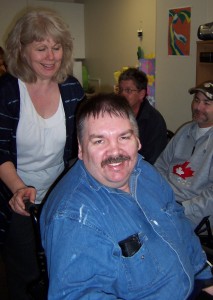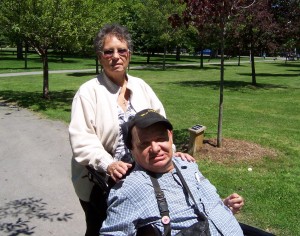An Adjustment for Everyone

When a loved one has sustained an acquired brain injury (ABI), their family members and close friends must also adjust to a new reality as well. You may find yourself taking on responsibilities that your loved one used to, or having to help them with tasks that could have done alone prior to their injury.
You may be frustrated and confused by behaviours that don’t make sense. All of this is part of the process of adjusting to the “new normal” of life after a brain injury. You are not alone and support is available.
It is important to recognize that each brain injury is unique. There are many factors which affect recovery after ABI, including the area of the brain injured and the severity of the injury as well as pre-existing health and abilities.
Because the brain is in control of every aspect of our body’s functioning, the effects of a brain injury can be widespread. The physical, sensory, cognitive, and emotional systems can all be affected. It is important to know that while the challenges can be extensive, the brain is also capable of developing new connections and continuing to make improvements over time.
The Role of Rehabilitation
Even after you return home from hospital, your loved one will benefit from rehabilitation and supports in the home. Depending on the injury’s severity, these may be short or long term. Be sure to take the time to speak with new professionals involved in your loved one’s care, to review information about what your loved one is struggling with and how they can be most helpful. They will also be able to share information with you about your loved one’s rehabilitation progress and reasonable goals. Ongoing communication can help ensure the rehabilitation program meets everyone’s needs, and that you are able to understand and support rehabilitation goals.
Maintaining Friendships
Sometimes the changes that occur as a result of an ABI may lead to family members or friends feeling unsure about how to interact with the individual affected. The truth is there is no one “correct” way. You had a unique relationship with that individual before their injury and no one can tell you exactly how your relationship should be now.
You may find some techniques are helpful, such as listening patiently and repeating what you’ve heard to confirm that you understand. Rather than relying on the individual with the ABI to make plans, you may need to take more initiative and offer them choices of activities you believe they would enjoy. You may find they need reminders or some assistance that was not required before. You must also accept that things have changed and that the individual’s preferences and needs may have as well. Just as you are getting used to these new circumstances, they too are coming to terms with the fact that things are not as they were before. Be supportive, respect their feelings and wishes, and know that by maintaining that relationship you are helping that person in their journey to healing and self-acceptance.
Dealing with Difficult Emotions
In some circumstances, an ABI may cause the person to react aggressively or in ways which may endanger themselves or those around them. Often these individuals do not mean to cause harm, but because of their brain injury they may have less control over their emotions than before. It is important to share this concern with your loved one’s care provider so that strategies can be put in place to protect all involved from harm, and help your loved one to regain control of their emotions. It is never something you should have to face on your own.
Taking Care of Yourself
This can be a difficult and uncertain time. Someone on whom you once depended upon may now require your support. As increased demands are placed on your family, you may notice relationship changing between all family members. This is a natural occurrence in which the family must reorganize itself to meet the new needs.
While some people may be fortunate to have a close confidant to confide in, others they find that those around them do not fully understand or can’t offer the level of assistance needed. It is often helpful to see a social worker or counsellor to discuss concerns in a confidential and non-judgmental atmosphere. Many people also find it helps to connect with an brain injury support group in your area.
 Many family members find it is healthy to help their loved one to engage in activities outside of the home, as this can be mutually beneficial. Your loved one has the opportunity to meet others and engage in enjoyable activities and you have the chance to relax and focus on your own needs for a time. You may feel like you should be able to manage on your own, but in reality it is often much healthier and happier for all involved when there is the opportunity to engage in activities separately. You will both lead more interesting and enriched lives as a result, and the time you share together will be more positive.
Many family members find it is healthy to help their loved one to engage in activities outside of the home, as this can be mutually beneficial. Your loved one has the opportunity to meet others and engage in enjoyable activities and you have the chance to relax and focus on your own needs for a time. You may feel like you should be able to manage on your own, but in reality it is often much healthier and happier for all involved when there is the opportunity to engage in activities separately. You will both lead more interesting and enriched lives as a result, and the time you share together will be more positive.
If you would like information on services for yourself or your loved one in your area, please Contact Us.
